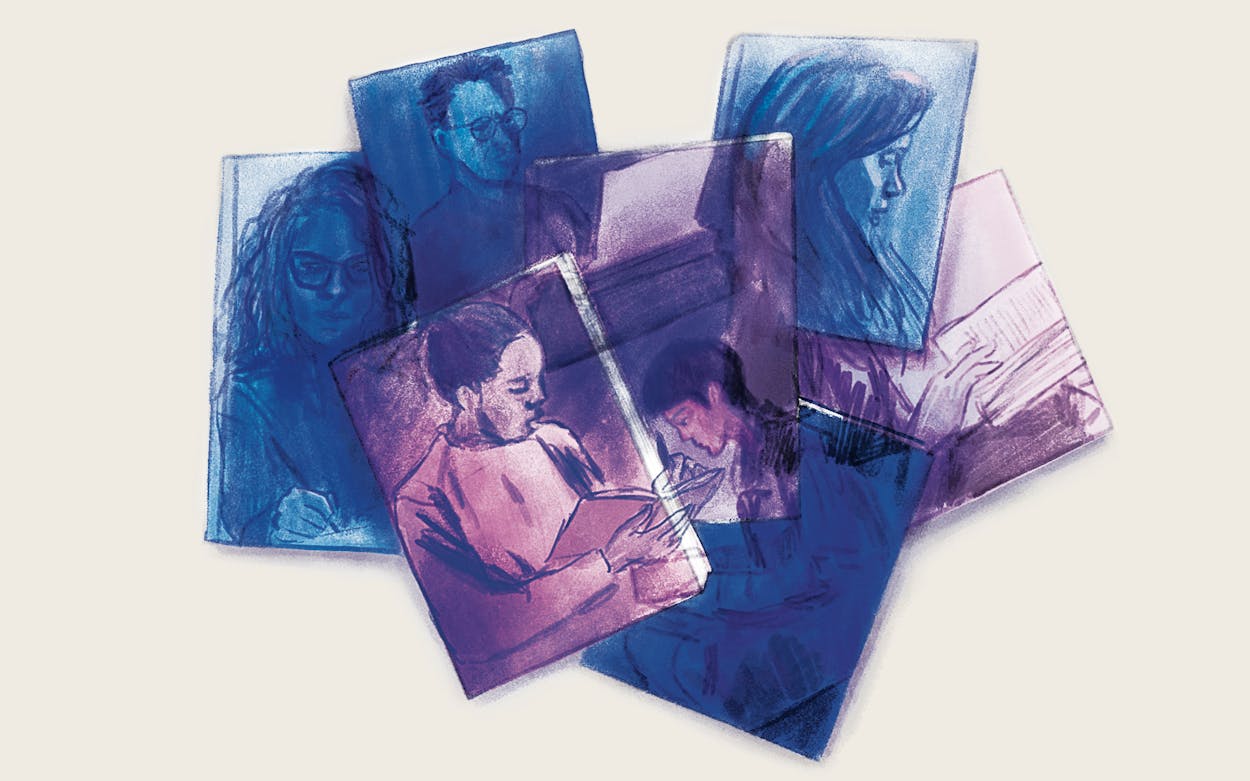“I’m exhausted,” Sergio Troncoso says. Considering that over the past two years he’s released two books, dealt with a life-threatening health crisis, and served as president of the Texas Institute of Letters, that’s understandable. But he’s never been one to take time off. His first book, the 1999 collection The Last Tortilla and Other Stories, won the Premio Aztlán Literary Prize, and since then he’s published seven more books, taught fiction and nonfiction at the Yale Writers’ Workshop, served as a judge for the PEN/Faulkner Award, and transformed the TIL.
So it’s no surprise when Troncoso, just minutes after saying he needs a break, roars back to life. “I am hungrier than ever,” he says. “I feel like I haven’t done anything. Honestly, that’s not a put-on. I’m hungry.” Troncoso is entering a liberating stage in his career; he’s accomplished enough to feel as if he has nothing left to prove, but he still has ambition to burn.
Though Troncoso resides primarily in New York City with his family, his books focus on the Texas-Mexico border, and he often writes about his hometown of Ysleta—an agricultural community founded in the 1680s and annexed by El Paso in 1955. “I want to explore different issues often relating to the border, but even deeper, I want to explore the problems in this country,” he says. “How we come together, how we fall apart, which I think is one of the central issues we’re facing right now. And, of course, Chicanos face this all the time because we sort of belong and we don’t belong.”

Troncoso’s latest novel, Nobody’s Pilgrims (Lee & Low Books / Cinco Puntos Press), follows three outcasts engaged in a dangerous journey from Ysleta to the East Coast. Seventeen-year-old Arturo “Turi” Martinez has been living with an abusive aunt and uncle since his mother died in a car crash. He’s forced to work in a chicken processing plant run by the corrupt John Dunbar, a middleman for a dangerous narcotraficante. When Turi hears that Dunbar is sending Arnulfo Muñoz, an undocumented teenager, on a delivery run to Kansas City, Turi decides that this is his chance to flee Ysleta and get a little closer to Connecticut, a place he’s only read about and seen on TV but has been fascinated by for years.
After discovering that the truck contains something dangerous, presumably drugs or guns, Turi and Arnulfo steal the vehicle. They don’t have much of a plan besides making it to Connecticut before the narcos track them down. Along the way they’re joined by Molly Crump, a Missouri teen desperate to leave her tiny hometown. But the narcos are in hot pursuit, and it turns out the truck contains something far more deadly than the imperiled trio imagine. Nobody’s Pilgrims, part road trip novel and part coming-of-age tale, is a story about three strangers on the margins of society who need one another’s help to survive.
“The ‘Nobody’ in the title is there because they’re outsiders,” Troncoso says. “They don’t belong anywhere, even within their own families. They’re orphans—or are for all practical purposes.” Over the course of their drive across the country, Turi and Arnulfo are treated with suspicion and even outright hostility from complete strangers. The novel reflects Troncoso’s perspective that “Mexicanos and undocumented immigrants are much more akin to the original Pilgrims.”
Nobody’s Pilgrims celebrates outsiders in general and immigrants in particular, an ethos that was central to Troncoso’s recent two-year tenure as president of the Texas Institute of Letters. “I threw my heart and soul into the TIL,” he says. “That meant representing all of Texas. We inducted more African Americans than ever before. During my tenure, we gave the Lifetime Achievement Award to Benjamin Alire Sáenz, who probably should have won it ten years ago. And this year we gave it to Celeste Bedford Walker, the first African American to ever win the award. It’s long overdue, in my opinion; she’s a great playwright. The organization truly is morphing into something beyond white guys from Dallas and Austin.”
Troncoso is no stranger to entering unfamiliar spaces and then fighting to establish himself. After high school, he left Ysleta to attend Harvard and went on to receive a graduate degree from Yale. “I didn’t know s—,” he says. “I was a seventeen- or eighteen-year-old kid who had never heard of the Ivy League. I knew John F. Kennedy went to Harvard, but that’s as much as I knew. I arrived there scared s—less, with bell-bottom jeans and Led Zeppelin T-shirts, because that’s all I had.”
Troncoso says it was his maternal grandmother who gave him the confidence to stick it out. “She was tough,” he says. “She had two uncles who died riding with Francisco ‘Pancho’ Villa. Family lore has it that she shot and killed two men who attempted to rape her during the Mexican Revolution. My parents were scared of her, but I was one of her favorites.” When he called her from Harvard during his freshman year, homesick and feeling like a failure, she told him, “Don’t come back with your tail between your legs. Show them who you are.” Like everyone else, he wasn’t about to disobey her.
The steel his abuelita helped put in his spine came in handy during his recent medical crisis. At the annual TIL awards banquet in April, Troncoso told a shocked crowd that he’d spent much of his term going through chemotherapy for follicular lymphoma. Friends had encouraged him to step down from the presidency and focus on himself, but he stuck with it, inspired by the example of another woman in his life, his wife. “She’s the reason I gritted it out—she’s a two-time breast cancer survivor who never stopped working during her chemo. So I didn’t quit either.”
Now cancer-free, Troncoso says the experience has changed him. “In an odd way, cancer’s very freeing. It wakes you up and it reveals to you your mortality and what you take for granted. A hug from your kids, the love of your wife, the wonderful feeling you feel when you’re writing a story: all those are temporary. Who knows how long they’ll last?”
Austin writer Richard Z. Santos is the author of the novel Trust Me and a former vice president of the National Book Critics Circle.
This article originally appeared in the August 2022 issue of Texas Monthly with the headline “Sergio Troncoso Is Making Sure That Texas Literature Represents All of Texas.” Subscribe today.







